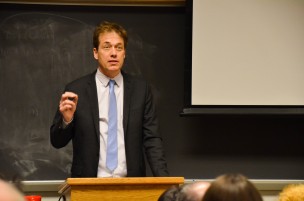
On Thursday, Feb. 12, the University hosted Sven Beckert, Laird Bell Professor of American History at Harvard University, who delivered a presentation on his New York Times bestseller “Empire of Cotton: A Global History.” Co-sponsored by Academic Affairs, the Center for Global Studies, and the History Department, Beckert’s speech summarized the main points of his work and followed up with a question-and-answer session.
Beckert began by explaining the necessity of his type of work. He stressed how integral capitalism is to a person’s life, despite the scrutiny it came under in the wake of the 2008 global recession.
“I see a great contemporary urgency to think about capitalism, because capitalism basically structures all of our lives today,” Beckert said. “In the wake of the global economic crisis of 2008, questions of the nature, past, and viability of capitalism suddenly appeared on evening talk shows and newspapers throughout the world.”
He also asserted that capitalism can be better understood when studied through a historical lens and a global perspective.
“I think that historians can contribute to the discussion on capitalism in very distinct ways that will help us get a new perspective,” Beckert said. “To truly understand the history of capitalism and the history of cotton, these diverse developments taking place in many different parts of the world need to be connected to one another. And here comes in the global approach. We need to follow cotton from the farm, the plantation, to the merchant house to the factories to the final consumers, in places ranging from Egypt to Argentina to Brazil, to England, to Japan, and from the United States to China.”
Though his primary topic is the development of global capitalism, he chose to trace its history through a single commodity: cotton. This particular product has been cultivated, exported, imported, and manufactured in all corners of the globe. From 1000-1900 A.D., cotton production and manufacturing was the number-one industry in the world.
Christina Sickinger ’18, who attended the lecture, was impressed by the breadth of his research.
“The way he used cotton to follow the history of capitalism was really interesting,” Sickinger said. “I also liked the emphasis on global history, not limiting the focus to a single country.”
Joel Michaels ’18 found Beckert’s work equally fascinating.
“I thought his methodology was really interesting, using an individual commodity as a case study for the sort of vast and unexplainable history of global capitalism,” Michaels said.
Cotton’s rising prominence in the new world economy gave rise to a specific type of capitalism, what Beckert calls “war capitalism.” He spent much time operationalizing this term both during the lecture and the Q&A session. In the latter section, at the request of an audience member, he made a distinction between mercantilism and war capitalism.
“The industrial capitalism that most of us think about, when we think about capitalism today, is really quite distinct from the capitalism that we see emerging in the 17th and 18th centuries,” he said. “I’m not so attached to my own term, but when I wrote my own book, I thought about the enormous degree of violence, expropriation, enslavement, colonialism, that mercantilism did not really emphasize what I saw at the core of the early history of capitalism.”
The introduction of cotton into new markets, such as in Europe, caused the most dramatic events regarding cotton in recent history. Industry boomed there, in part due to the fact that cotton plants themselves were grown so far from the manufacturing centers of industrial powerhouses such as England. While this ensured that farmland would not encroach upon the growing urban centers, it did play a part in developing what Beckert refers to as the military industrial complex. Out of this system grew the United States’ dominance in cotton exportation in the 19th century.
“The United States was the one place in which empty land and plentiful bonded labor existed,” Beckert said. “In the areas where cotton was to be grown, an all-powerful and entrenched social structure needed to be dislodged. Instead, indigenous inhabitants were forcefully removed and laborers were forcefully moved in.”
As a result, the American Civil War—what Beckert considers the greatest crisis of war capitalism—was a trying time for the expanded cotton industry. With virtually no cotton exportation from the United States between 1861 and 1865, European manufacturing centers faced a severe deficiency of raw materials, leading to widespread unemployment and protests.
The world survived with virtually no cotton exportation from the American South between 1861 and 1865, however, demonstrating that mass planting and exportation of cotton could survive independently of slave labor. In order to secure the raw materials they needed, European governments pressured other cotton-producing countries to strengthen their means of production. Consistent with the emphasis on global history, Beckert explained how the Civil War greatly impacted Egypt, Brazil, and India, further integrating what were remote parts of the world into the global economy.
Beckert concluded his formal presentation by again relating the development of global capitalism and the growth of the cotton industry.
“If we want to draw some lessons from the history of the empire of cotton,” Beckert said, “we can learn for example that the shape of global networks in the past, just like today, was not only dependent on the interests of capitalism. Instead, the collective activity of peasants and workers made a decisive difference in the empire of cotton.”



Leave a Reply